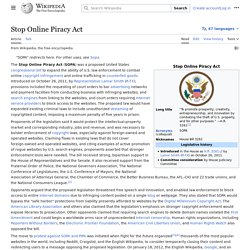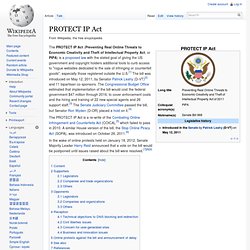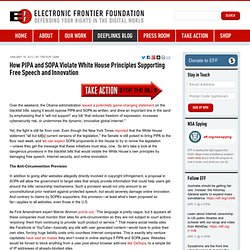

Stop Online Piracy Act. Proponents of the legislation said it would protect the intellectual-property market and corresponding industry, jobs and revenue, and was necessary to bolster enforcement of copyright laws, especially against foreign-owned and operated websites.

Claiming flaws in present laws that do not cover foreign-owned and operated websites, and citing examples of active promotion of rogue websites by U.S. search engines, proponents asserted that stronger enforcement tools were needed. Opponents claimed that the proposed legislation threatened free speech and innovation, and enabled law enforcement to block access to entire internet domains due to infringing content posted on a single blog or webpage. They expressed concerns that SOPA would bypass the "safe harbor" protections from liability presently afforded to websites by the Digital Millennium Copyright Act.
Overview[edit] The originally proposed bill would allow the U.S. On December 12, 2011 a revised version of the bill was tabled. Meeting Materials: Flyers, Badges.. « Fight For The Future. PROTECT IP Act. The PROTECT IP Act is a re-write of the Combating Online Infringement and Counterfeits Act (COICA),[5] which failed to pass in 2010.

A similar House version of the bill, the Stop Online Piracy Act (SOPA), was introduced on October 26, 2011.[6] In the wake of online protests held on January 18, 2012, Senate Majority Leader Harry Reid announced that a vote on the bill would be postponed until issues raised about the bill were resolved.[7][8][9] Content[edit] The bill defines infringement as distribution of illegal copies, counterfeit goods, or anti-digital rights management technology. Infringement exists if "facts or circumstances suggest [the site] is used, primarily as a means for engaging in, enabling, or facilitating the activities described Supporters[edit]
How PIPA and SOPA Violate White House Principles Supporting Free Speech and Innovation. Over the weekend, the Obama administration issued a potentially game-changing statement on the blacklist bills, saying it would oppose PIPA and SOPA as written, and drew an important line in the sand by emphasizing that it “will not support” any bill “that reduces freedom of expression, increases cybersecurity risk, or undermines the dynamic, innovative global Internet.

" Yet, the fight is still far from over. Even though the New York Times reported that the White House statement "all but kill[s] current versions of the legislation," the Senate is still poised to bring PIPA to the floor next week, and we can expect SOPA proponents in the House to try to revive the legislation—unless they get the message that these initiatives must stop, now. So let’s take a look at the dangerous provisions in the blacklist bills that would violate the White House’s own principles by damaging free speech, Internet security, and online innovation: The Anti-Circumvention Provision The “Vigilante” Provision.